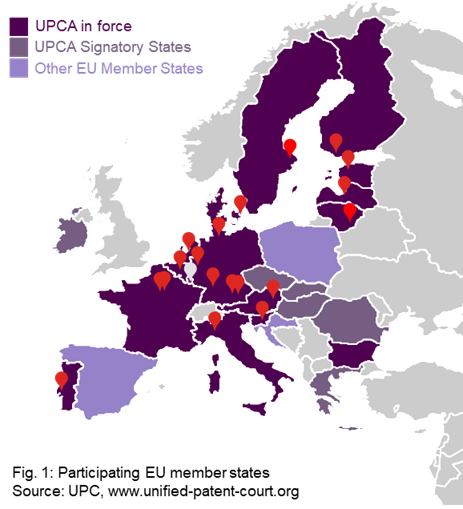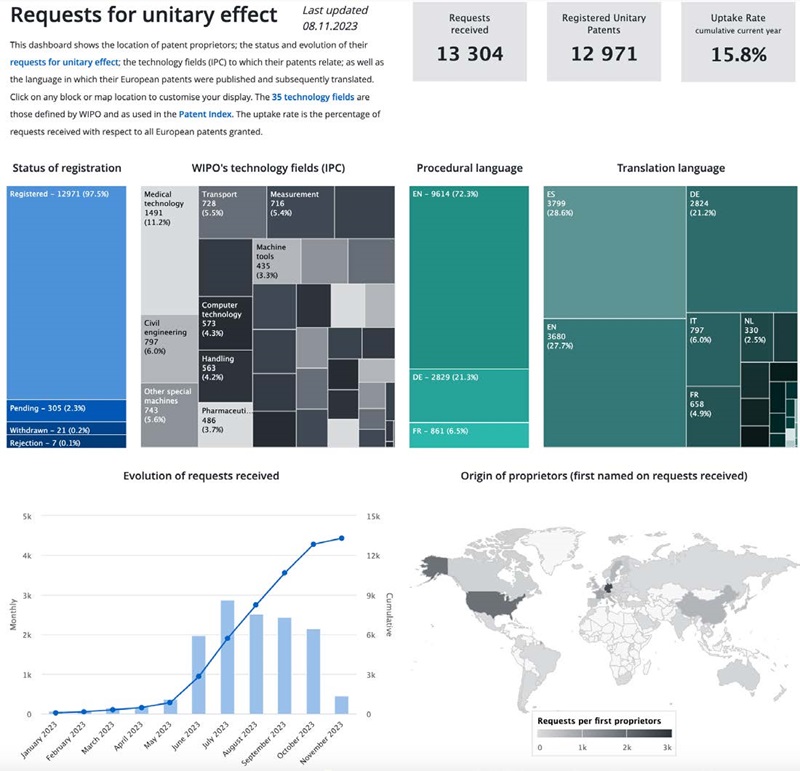Background
With the introduction of UPs, applicants will be able to obtain patent protection in 17 EU member states by filing a single application with the European Patent Office (EPO). This is expected to make the procedure simpler and more cost-efficient.

The UPC is a new international court established by the participating EU member states, which is responsible for questions of infringement and validity of both UPs and European patents. This is intended to eliminate the need for costly parallel litigation and increase legal certainty.
Unitary patent
To increase transparency, the EPO has published a dashboard that is updated daily and provides information on how the unitary patent is being adopted. By the beginning of November , a total of 13.304 "requests for unitary effect" had been received and 11646 UPs had been entered in the Register.
Unsurprisingly, most unitary effect applications have been filed by European patent applicants, led by Germany and France.

Dashboard Unitary Patent Screenshot as of 31 October 2023 Source: EPO/Statistics and trends centre, www.epo.org
Unified Patent Court
The cases are divided between the three seats of the central division according to the subject-matter of the patent in dispute:
| Classification based on WIPO International Patent Classification (A-H) |
| Paris |
Munich |
Milan |
(B) Performing operations, transporting
(D) Textiles; paper
(E) Fixed constructions
(G) Physics
(H) Electricity
Supplementary protection certificates
|
(C) Chemistry, metallurgy, without Supplementary protection certificates
(F) Mechanical Engineering; Lighting; Heating; Weapons; Blasting
|
(A) Human necessities;, without Supplementary protection certificates
|
Appointment of UPC judges
The UPC has completed its appointments of 105 judges - 37 legally qualified and 68 technically qualified. These are mostly national judges, with a majority from Germany, predominantly judges at the Federal Patent Court. In recent appointments, examiners from patent offices in UPC States and technical judges from patent courts have been prioritized to improve overall competence and address concerns about the impartiality of patent attorneys from private law firms and corporations.
Current infringement and nullity proceedings
There are currently 72 cases pending before the UPC, including 38 infringement proceedings, 19 central revocation actions and 14 preliminary measures. The UPC's caseload is spread across various regions, with the local chamber in Munich leading infringement proceedings with 17 cases. German chambers dominate with three out of four cases.
Fig. 2: Overview infringement actions and counterclaims for revocation as of October 31, 2023
Growing number of SEP-related UPC lawsuits
Panasonic is pursuing three lawsuits each against Oppo and Xiaomi in the local chambers in Mannheim and Munich. These lawsuits represent the first significant dispute over mobile communications and standard essential patents (SEPs) of the UPC. 15 of the approximately 38 infringement lawsuits currently pending before the UPC involve SEPs.
Bifurcation principle or not?
In a case between Amgen and Sanofi, the court considered the admissibility of (almost) simultaneously filed invalidity and infringement actions before different chambers.
The long-running dispute between Amgen and Sanofi over the cholesterol-lowering drug Praluent took a new turn with the introduction of the UPC. Amgen filed an infringement suit with the local chamber in Munich on June 1, 2023. The same day, Sanofi filed an invalidity action with the central chamber in Munich. A glitch in the electronic case management system (CMS) led to a race between the two parties to file their claims on paper. Ultimately, Sanofi filed its invalidity action by hand at the UPC's office in Luxembourg, while Amgen filed its infringement action in hard copy at the local chamber in Munich. Amgen then filed a preliminary objection claiming that it had filed its infringement action first and Sanofi's invalidity action was therefore inadmissible. Ultimately, the court ruled in favour of Sanofi, whose action had been received 30 minutes earlier than Amgen’s. This resulted in the infringement proceedings being heard in the Munich local chamber, while the Munich central chamber will be responsible for the invalidity proceedings. This case has triggered discussion on the issue of bifurcation in the UPC.
First preliminary injunction
In the case of 10x Genomics v NanoString, the Munich Local Chamber issued its first preliminary injunction. 10x Genomics claims that NanoString's CosMx products for RNA detection infringe unit patent EP 4 108 782 B1. The judges found that the patent was likely valid and infringed and granted the patentee's request for a preliminary injunction. The decision did not require a security deposit and allows immediate enforcement in all 17 UPC member states.
Revocation of the opt-out
The Helsinki Local Chamber has issued its first ruling in the case of AIM Sport v Supponor. AIM Sport Vision sought an injunction against Supponor, which was rejected by the judges. AIM Sport attempted to waive the initially declared opt-out of their patent, although proceedings were already pending nationally (DE, UK). The judges found that this action violated Article 83 (3) UPCA, which states that opt-outs can only be withdrawn as long as national court proceedings concerning the patent or application have not been initiated. Therefore, the court dismissed both the plaintiff's motion and the action on the merits. The Helsinki Local Chamber's decision will have an impact on numerous patents for which an opt-out was initially declared and later returned to UPC jurisdiction by a waiver. Given the significant impact on evolving UPC jurisdiction, an appeal seems likely.
Conclusion
In the first five months since the Unified Patent Court began its work, the new patent system has been intensively adopted and tested. Initial experience has been gained and some questions have arisen, for example about bifurcation and the limits of opt-in. At least at this early stage, court proceedings and legal interpretations are strongly influenced by the expertise and legal background of the responsible judges (e.g., 10x Genomics v NanoString). Since Munich appears to be a popular seat for litigation before the UPC, this means that German judges and German practice could significantly influence early UPC jurisprudence in all participating states. It will be exciting to see how the new patent system continues to take shape with each new proceeding before the UPC.







